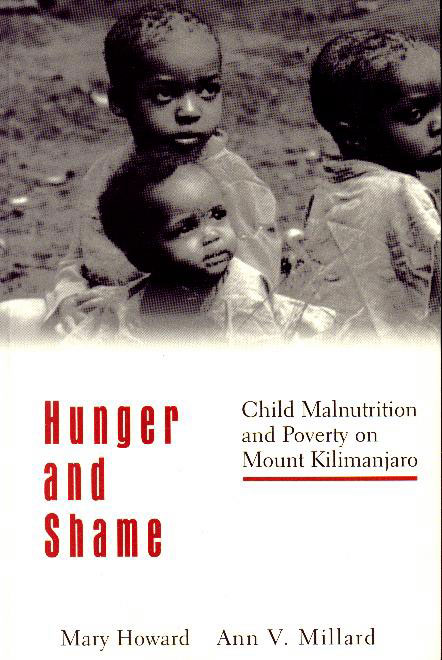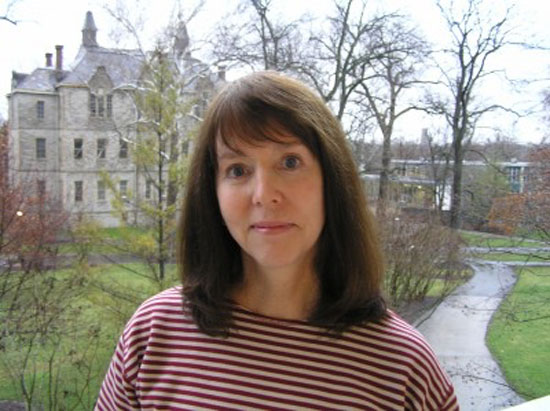Hunger and Shame:
Child Malnutrition and Poverty on Mt. Kilimanjaro
by Mary Howard and Ann V. Millardis a passionate account of child malnutrition among a relatively wealthy populace, the Chagga of Mount Kilimanjaro, Tanzania. Views of family members, health workers, and government officials provide insights into the complex of ideas, institutions, and human fallibility that sustain malnutrition.
Discussing the moral and practical dilemmas posed by the presence of malnourished children in the community, the authors explore the shame associated with child hunger in relation to social organization, colonial history, and the global economy. Their discussions challenge the reader to ask fundamental questions concerning ethics, the politics of poverty, and shame and social relations.
Routledge, New York and London, 1997

This is the single most important book on African poverty you are likely to read. Ok, it doesn't compare with the scope of Cliffe's The African Poor. But it is very powerfully written and extremely insightful.
Those familiar with participatory assessments will know they often find that respondents blame the poor for their plight (not surprising, we do the same in developed countries) - but these results are usually ignored by the researchers.
This book demonstrates how important this finding is - not because the poor ARE to blame for their poverty, but because the stigma attached to being poor creates a social poverty trap.
Howard White - IDS, University of Sussex
Hunger and Shame:
Child Malnutrition and Poverty on Mt. Kilimanjaro
is available at Amazon.com
Google References - for Hunger and Shame: Child Malnutrition and Poverty on Mt. Kilimanjaro
Mary T. Howard,
Recipient of the Adam Poe Medal
Professor of Sociology and Anthropology, 1985-2019

The Transcript / Home / News / Mary T. Howard
Recipient of the Adam Poe Medal
Mary was born in Columbus, Ohio. She graduated from St. Mary of the Springs Academy and later earned a B.A. in sociology from St. Mary of the Springs College, but not before studying nursing for two years at Georgetown University.
Mary married shortly after graduation and moved to Lansing, Michigan, where she worked as a psychiatric social worker for a year, and where she and her husband, Tom, started the first half-way house in Michigan for deinsititualized mentally ill men. Over a two-year period, they supported 36 men in finding work and housing in the community.
In 1970, Mary earned her master’s degree in anthropology from Michigan State University, after which she and her husband left to conduct research in East Africa. While in Tanzania from 1970 to 1975, Mary participated in a number of year-long research projects as a member of the public health program in the Kilimanjaro Christian Medical Center, including a follow-up study of families whose children were malnourished. In Tanzania, she gave birth to her first son, Matthew. Her younger son, Christopher, was born in Kisumu, Kenya.
Upon her return to Michigan and after a divorce, Mary took a job as a live-in house manager and later case manager in a group home for 16 mentally disabled adults. She reentered graduate school in 1978 and received her doctorate in anthropology in 1980. Her dissertation, “Kwashiorkor on Kilimanjaro: The Social Management of Childhood Malnutrition,” later became her 1997 Routledge publication, Hunger and Shame: Poverty and Child Malnutrition on Mt Kilimanjaro.
In 1985, after spending a year in Bolivia with her sons and her anthropologist brother, Mary returned to Ohio and began teaching at Ohio Wesleyan. She was hired into a joint position, directing Women’s Studies while also being half-time in Sociology and Anthropology. As director of Women’s Studies, she oversaw the first campus climate survey for women students, which contributed to the development of OWU’s sexual harassment policy.
In 1989, Mary became a full-time faculty member of the SOAN department, where she taught a wide range of courses including cultural anthropology, medical anthropology, demography, Perspectives on Africa, self and society, feminist theory, Queer Lives in World Cultures, Amish and Appalachian Peoples and Cultures, applied sociology and anthropology, and ethnographic and documentary film and filmmaking.
Mary’s efforts have left their mark on Ohio Wesleyan and OWU students in numerous ways. In 1995, she began discussions with Butler A. Jones to develop a speaker’s series to honor him as OWU’s first African American faculty member. For most of its 26 years, Mary oversaw the Butler A. Jones Lecture Series on Race and Society, identifying and/or inviting speakers and getting co-sponsors from around campus. Her documentary filmmaking course, co-taught with Chuck Della Lana, director of the Media Center, has led to over 75 student documentary films and 15 student film festivals. Mary initiated a program to teach the Sociology and Anthropology capstone course at the Ohio Reformatory for Women, integrating OWU students and inmates into the weekly class. She co-taught this course with John Durst for three years.
Long before the advent of travel-learning courses, Mary exposed students to other peoples and cultures. From 1987 to 1992, she accompanied students on trips to Haiti and the Dominican Republic. Over the years, Mary has accompanied OWU students on trips to Mexico, China, Tanzania, Kenya, India, Bolivia, Peru, Haiti, and the Dominican Republic.
In addition to her publications in East Africa, she has published in The American Anthropologist, Social Science and Medicine, Adult Residential Care Journal, and Medical Anthropology Quarterly. She also has created and produced three documentary films on poverty and homelessness in Columbus Ohio – Cloud People, Outreach, and Swept Out – and several promotional films for The Open Shelter.
For her teaching and activism at OWU, Mary has been awarded numerous well-deserved recognitions, including the Sherwood Dodge Shankland Award for the Encouragement of Teachers, the Andrew Anderson Campus Community and Conscious Award, the first (2007) President’s Commission on Racial and Cultural Diversity Award, and the 2014 President’s Commission on Racial and Cultural Diversity Award.
Mary will retire to a home on 32 acres north of Granville and will spend time with her son, Matthew, and his family in New York and with her son, Christopher, and his family in Guatemala.